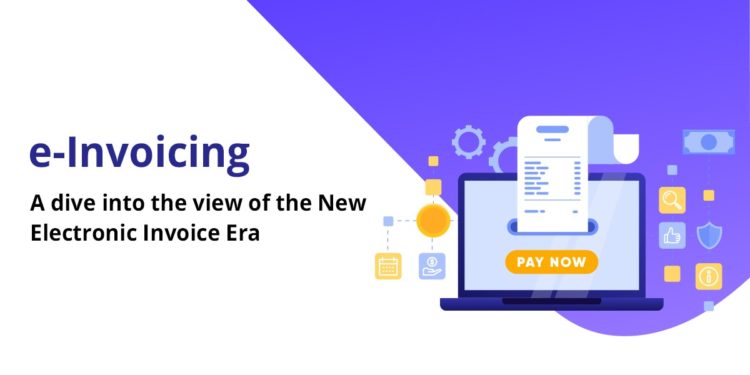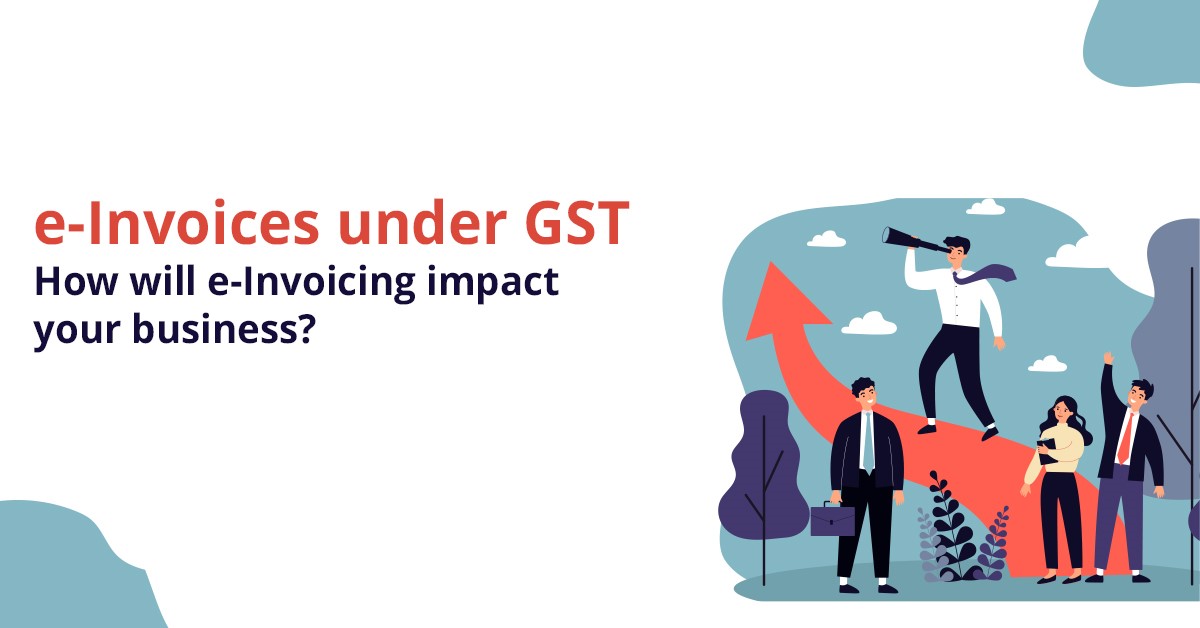As per the recent notification dated March 23rd, e-Invoicing shall implement on businesses in India from October 1st, 2020. Since its a whole new & automated system, it would be better for you to know the expert insight for a better understanding.
The Government has recently announced a series of small changes made to the e-Invoicing System.
In this article, we have covered & shared our insights on e-Invoicing & its implementation in India.
What is e-Invoicing in India
e-Invoicing under GST is a new practice of creating, validating & managing B2B (major) invoices of large businesses.
As per the latest notification dated, July 30th, 2020, e-Invoicing shall apply to businesses having an annual aggregate turnover of more than Rs. 500 Crores instead of Rs. 100 Crores, which was decided earlier.
Under e-Invoicing, you will have to create invoices in the format specified by the government & upload it on the Invoice Registration Portal for validation.
On successful validation, the portal will generate a unique Invoice Reference Number & QR code for the invoice converting it into an e-Invoice.
Note- In the case of errors in your invoices, the validation will fail & you will get an error file, for your reference, you can rectify the invoice accordingly & re-upload it.
Additionally, e-Invoice is not limited to B2B invoices only, but it also applies to B2G Invoices, Export Invoices, RCM Invoices, Credit Notes, Debit Notes & QR Codes for B2C Invoices.
Working of the Invoicing Model under GST in India
Presently, there is no systematic working model of invoice management in place, in our country.
Invoices are made in random formats & shared with the dealers or customers as hard-copy or soft copy as per the convenience of both the parties
Also, at present, you have to manually upload the details of the invoices in your GSTR-1 & while creating e-Way Bills.
This all will be revamped in the e-Invoicing era. We have mentioned the changes that e-Invoicing will bring to GST, below-
- Format- CBIC has already drafted & modified recently a new universal invoice format, that all the taxpayers will have to follow.
- Electronic- Since e-Invoicing will take place on desktops, most of the invoice-sharing & store will be in the form of soft-copy, unless required otherwise.
- Digitally signed & validated- The e-Invoices will be 100% authentic because it will be validated & digitally signed in real-time
- Data auto-population- The IRP will share the e-Invoice data with the GST portal & the details will auto-populate in your GST returns.
- e-Way Bills- The IRP will also share the e-Invoice data with the e-Way Bill Portal, & part A of your e-Way Bill will be auto-populated from the same.
Impact of e-Invoices on businesses
Since e-Invoices is only applicable to large scale businesses you must think that it will not affect the small business, but it is a misconception.
e-Invoicing will impact the entire business industry on a huge level, affecting some more than others.
It may create the following issues for businesses-
- Real-time Upload- Businesses may find it difficult to comply with the fact that the invoice generation process is made lengthier, & real-time.
- 24 Hours Cancelation- You are only allowed to cancel an e-Invoice within 24 hours of generation, post which you will have to create a Credit Note against that invoice to nullify it
- Rectification of invoices- You can rectify your e-Invoice from the IRP again, within 24 hours of generation only.
- Availability & storage of e-Invoices- The e-Invoices will be available on the for 24 hours from the time of generation, you will have to find your own way around the storage trouble.
- Changes to your Billing System- You will have to make heavy changes to your billing system to comply with the schema format specified by CBIC.
- Compliance burden- The overall compliance burden can also be overwhelming for businesses, as e-Invoicing is a lengthy & time-consuming process.
- Less clarity- The Government has still not given full clarity on the provisions of e-Invoicing. Such as the motive of e-Invoicing is to deal with tax evasion which occurs the most in B2C transactions. If e-Invoice does not cover B2C invoices, how effective will it actually be?
- Bulk Generation- There is no facility to bulk generate e-invoices, you will have to create one invoice at a time form the IRP.
Insights on the implementation of e-Invoicing
Despite all the problems, e-Invoicing will be highly beneficial for businesses in the longer run. It may be lengthy, time & effort consuming, but there are other solutions to deal with such problems such as ASPs & GST Suvidha Provider.
You may not have to make heavy IT changes if you take the help of APIs through GSPs.
Other than that, e-Invoices will actually reduce the compliance burden in other parts of the GST system.
Some of which are mentioned below-
- A more sophisticated approach- reporting of the Invoices on a unified portal helps all the members of the loop have access to the information, at a single site.
- Ease in Filing GST returns- As the invoice data will auto-populate from the IRP it will be easier for you to file your returns accurately & without delay
- Ease in generating e-Way Bills- As the e-Invoice data will be used to generate Part-A of the e-Way Bill you will only have to furnish Part-B of your e-Way Bills
- Fewer chances of audits & notices- Since the data will be transparently available for the tax officials to access at any time, because of the real-time reporting of invoices, there will be fewer chances of audits & notices.
- Error-free- Automation & validation, assures more accuracy in your invoicing process & eliminate errors.
- Better Reconciliation- As the process becomes more systematic, sorted & transparent the reconciliation will be more vigorous & accurate.
- Smoother cash-flow- The e-Invoices will be shared with your recipients electronically, hence reducing the chances of misplacing of invoices, thus enhancing the cash-flow of your business.
- Partial Elimination of Paper Invoices- As the process will be made digital the need for paper invoices will gradually decrease, again saving your money & the environment.
- Enhanced readability of invoices- The schema format will be the same for all invoices, thus invoices will readable in any billing software & ERPs by the users.
- QR Codes & IRN- The QR Code & IRN will be the identity of the invoices under e-Invoicing, you will not have to physically see the invoice to know it’s details you can simply use the IRN & QR Code to find the details of the particular invoice.
Conclusion
To sum it up in a few words, e-Invoicing can be both a blessing & a curse for the business, depending on its implementation, further modifications & business adaptability.
The government must give more clarity to the business & the businesses must also find other alternatives to deal with the compliance issues of the new provision.
In this, GSPs like GSTHero can immensely help your businesses without having to make any internal & heavy changes to your IT Billing structure.
With GSThero e-Invoice software integration, you can perform the bulk operation on e-invoices, such as generation, editing, cancelation, validation, IRN & QR Code generation, etc. within the ERP itself.
Note- GSTHero can be integrated with any ERPs including Tally, SAP, Marg, Microsoft Dynamic, Oracle & other customized ERPs.
About the Author– GSTHero– Making GST Simple! GSTHero is the best GST filing, e-Way Bill Generation & E Invoicing Software in India. GSTHero is a government authorized GST Suvidha Provider. Both Businesses and Tax Practitioners can file GSTR 1, GSTR 3B, GSTR 9 and GSTR 9C with all supporting reports. 1 Click Auto Reconciliation & report-matching feature helps you in claiming up to 100% ITC and finds your GST Defaulting Suppliers. GSTR2A vs GSTR-3B, GSTR-1 vs GSTR-3B, ‘GSTR-1, GSTR-2A & GSTR-3B’ annual report matching is also provided by GSTHero.
GSTHero ERP Plugins provide 1 Click e-Way Bill & E-Invoice, Generation, Operation & Printing from your own ERP like Tally, SAP, Marg, Busy, Microsoft Dynamics, Oracle & others itself with high data security












![[Live] Updates and Tax changes for Budget 2023 | Tax on cryptocurrency | Income tax and GST udpates in Budget 2023 [Download Bill]](https://www.taxontips.com/wp-content/uploads/2023/02/Budget-2023-120x86.webp)


Comments 4